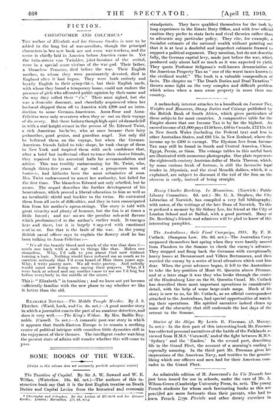FICTION.
CHRISTOPHER AND COLUMBUS..
THE author of Elizabeth and her German Garden is now to be added to the long list of war-novelists, though the principal characters in her new book are not even war-workers, and the scene is chiefly laid in America before America came in. Yet the twin-sisters von Twinkler, joint-heroines of the recital, were in a special sense victims of the war god. Their father, a blameless Prussian, died before the war_ Their English mother, to whom they were passionately devoted, died in England after it had begun. They were both entirely and
loyally English in their sympnthi but their English uncle, with whom they found a temporary home, could not endure the presence of girls who affronted public opinion by their name and the way they rolled their " r's." Their aunt sighed, but she was a domestic doormat, and cheerfully acquiesced when her husband shipped them off to America with £200 and an intro- duction to some German-Americans. Anna-Rose and Anna- Felicitas were only seventeen when they se' out on their voyage of dissovery. Butt hese forlorn though high-spiri ed damsels fell in with a real knight-errant in the person of Mr. Edward Twist, is rich American bathe:or, who at once became their fairy godmother, good genius, and guardian angel. Not only did lie befriend them on the voyage, but when the German- American friends failed to take shape, he took charge of them in New York and inspired them with such confidence that, after a brief but ineffectual effort to trace their elusive friends, they repaired to his ancestral halls for accommodation and advice. This was terribly embarrassing for Mr. Twist, who, though thirty-five years of age and a prosperous man of busincs., had hitherto been the most submissive of sons. Mrs. Twist endeavoured to assert her authority, but failed for the first time. The blameless Edward not only rebelled, but he swore. The sequel describes the further development of his benevolence, which proved a liberal education to him as well as an invaluable shield and buckler to the twins. He extricated them from all sorts of difficulties, and they in turn emancipated him from his mother's apron-strings. The story is told with great vivacity and plenty of humour, but the fun is at times a little forced ; and one misses the peculiar sub-acid flavour which predominated in the author's earlier work. It emerges here and there, lot it is largely 'tempered with emotional sentTin mt. But that is the fault of the war. As the young British naval officer says to explain the flowery stuff he has been talking to Anna-Felicitas :— " Ws all the beastly blood and muck of the war that does it— sends one back with a rush to things like that. Makes one shameless. Why, I'd talk to you about God now without turning a hair. Nothing would have induced me so much as to mention seriously that l'd even heard of Him three years ago. Why, I write poetry now. We all writs poetry. And nobody would mind now being seen saying their prayers. Why, if 1 were back at school and my mother came to see me I'd hug her
before everybody in the middle of the street." • • This i; " Elizabeth " in transition ; and we have not yet become sufficiently familiar with the new phase to say whether we like it better than the old.



































 Previous page
Previous page